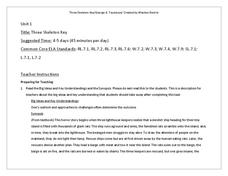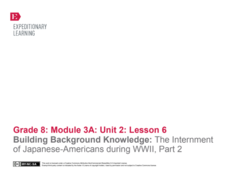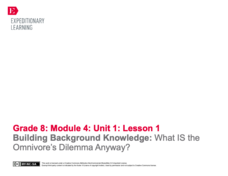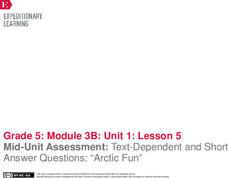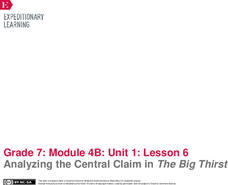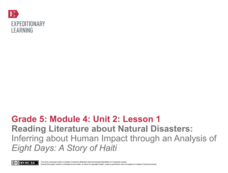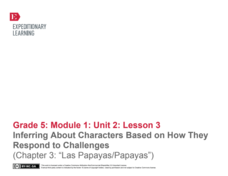EngageNY
Reading for Gist, Answering Text-Dependent Questions, and Determining Author’s Purpose: Industrial Organic Food Chain
After re-reading The Omnivore’s Dilemma using a Reading Closely: Guiding Questions handout, class members use sticky notes to annotate and determine the gist of the text. Finally, they use an Author’s Purpose graphic organizer to...
Washoe County School District
Three Skeleton Key
Conduct a close reading of George G. Toudouze's well-known horror story "Three Skeleton Key." This plan breaks up the reading into several steps and provides text-dependent questions to ask along the way. Learners will have the chance to...
Scholastic
Citing Text Evidence
Could you go without your cell phone for 48 hours? Pose this question to your class and then read the article provided here. Pupils mark the text and and complete a graphic organizer that requires the use of textual evidence.
EngageNY
Text-Dependent Questions and Making a Claim: Digging Deeper into Paragraphs 20–23 of Steve Jobs’ Commencement Address (and connecting to Chapter 11)
In preparation for the unit exam, groups employ the strategies they have been practicing to formulate an interpretative claim about the connections between Christopher Paul Curtis's " Bud, Not Buddy, and Steve Jobs' 2005 Stanford...
Curated OER
Express Yourself Lesson Seed 6 Close Reading
Look back at the third chapter of The Cay with your class. Pupils will conduct a close reading, taking a second look at a chunk of text and responding to a series of text-dependent questions. Wrap up with an analytical writing prompt...
EngageNY
Building Background Knowledge: The Internment of Japanese-Americans during WWII, Part 2
Scholars learn about primary sources with a Primary Sources: Japanese-American Internment during World War II packet. Pupils work with a partner to read challenging sources in the packet while making notes in the margins. They then...
EngageNY
Building Background Knowledge: What IS the Omnivore’s Dilemma Anyway?
What's the best thing on the menu? Scholars enter the room, complete a gallery walk of menus to choose a food to pretend to order, and then discuss how they made the decision. Next, they read The Omnivore's Dilemma and relate their...
EngageNY
Mid-Unit Assessment: Text-Dependent and Short Answer Questions: “Arctic Fun”
Let's have a little fun! Readers take a mid-unit assessment by answering text-dependent and short-answer questions using the text Arctic Fun. They then complete a form to track their progress in the unit thus far.
EngageNY
Analyzing Events: Carlotta’s Journey
How does one talk silently? Class members participate in a silent communication activity known as a Chalk Talk. During the activity, they answer text-dependent questions analyzing Carlotta’s Journey. They use markers and chart paper to...
EngageNY
Defining Key Terms: Gender and Internal Identity
Be a team player! Learners examine the article Team Players and discuss how the title might relate to identity. They then analyze the article using the sheets Reader’s Notes: Team Players and Text-Dependent Questions: Team Players....
EngageNY
Introducing the Struggle for Survival in the Introduction of World without Fish
No fish? Catch a word. Scholars read World without Fish and record unfamiliar vocabulary in their word catchers. They discuss word meanings as well as root words. They answer text-dependent questions before discussing the importance of...
EngageNY
Continued Close Reading of Nasreen's Secret School: Discussions of Questions and Evidence
Third graders answer text-dependent questions of the story Nasreen's Secret School both independently and then collaboratively through using the carousel of questions strategy. This plan is the seventh instructional activity in a...
EngageNY
Analyzing the Central Claim in The Big Thirst
Quench the class's thirst for knowledge while building analytical skills. Scholars listen as the teacher reads excerpt from the book The Big Thirst. They then complete a close read and answer text-dependent questions from pages one...
EngageNY
Contrasting Two Settings (Chapter 6: "Lost Melones/Cantalouples")
Continue working through Esperanza Rising, by Pam Munoz Ryan, by looking into language choices and discussing text-dependent questions. Pupils converse in small groups and as a class about plot, setting, and figurative language. Using...
EngageNY
Reading Literature about Natural Disasters: Inferring about Human Impact through an Analysis of Eight Days: A Story of Haiti
This is a disaster. Scholars look through the book Eight Days: A Story of Haiti and discuss their wonderings about the text and natural disasters. They then complete a first read to determine gist and second read to answer...
EngageNY
Reading Literature about Natural Disasters: Inferring about the Impact of Hurricane Katrina on People Living in New Orleans
I survived! Scholars read a firsthand account from a natural disaster survivor in the text Save Bella! They record the gist of the text in their journals and answer text-dependent questions. They then take notes to more deeply analyze...
EngageNY
Close Reading: Paragraphs 1–5 of “Water Is Life”
Be more specific. Scholars take a look at domain-specific vocabulary by discussing an anchor chart. They then look at vocabulary words recorded from paragraphs one through five in Water of Life. After analyzing the vocabulary used in the...
EngageNY
Analyzing Main Ideas and Details: Why Care about Water?
Pay attention to details! After completing text-dependent questions about paragraphs 10-12 of "Water is Life," scholars view the video "Why Care about Water. "They view the video three times and use a Main Idea and Details note-catcher...
EngageNY
Inferring About Characters Based on How They Respond to Challenges (Chapter 3: "Las Papayas/Papayas")
Start off your day with a quick reading comprehension quiz about chapter three of Esperanza Rising by Pam Muñoz Ryan. After they complete the quiz, pupils participate in a discussion and look closely at the text. A strong Common Core...
EngageNY
Mid-Unit Assessment: Analyzing an Informational Text about a Refugee Experience
Refugee & Immigrant Transitions is an organization that helps newcomers adjust to life in the United States through education and community leadership opportunities. As part of a mid-unit assessment, pupils independently read a...
EngageNY
Informational Text Features: Analyzing “Hawaii’s Endangered Happy Face Spider”
Some things are better the second time around. Scholars reread an article about Hawaii's happy face spider, answering text-dependent questions as they read. Then, they use a Venn diagram to compare the text features of interviews and...
EngageNY
Understanding Themes in Esperanza Rising
Determining a theme or central idea is greatly emphasized in the Common Core standards. Target that skill though big metaphors and central symbols in Pam Muñoz Ryan's Esperanza Rising. Help your class reach the standard through...
EngageNY
Text-to-Text Connections: Pygmalion
Scholars refer to a British Dialect/Slang anchor chart as they answer text-dependent questions over section eight of Pygmalion. While learners work on the questions, the teacher conducts check-ins on the progress of their independent...
EngageNY
Comparing Two Main Ideas in an Informational Text: Meg Lowman’s Methods for Researching the Rainforest (Pages 35–36)
Alike or different? Scholars compare and contrast the research methods used by Meg in The Most Beautiful Roof in the World. They record information about her research in a three column note catcher before answering text-dependent...



